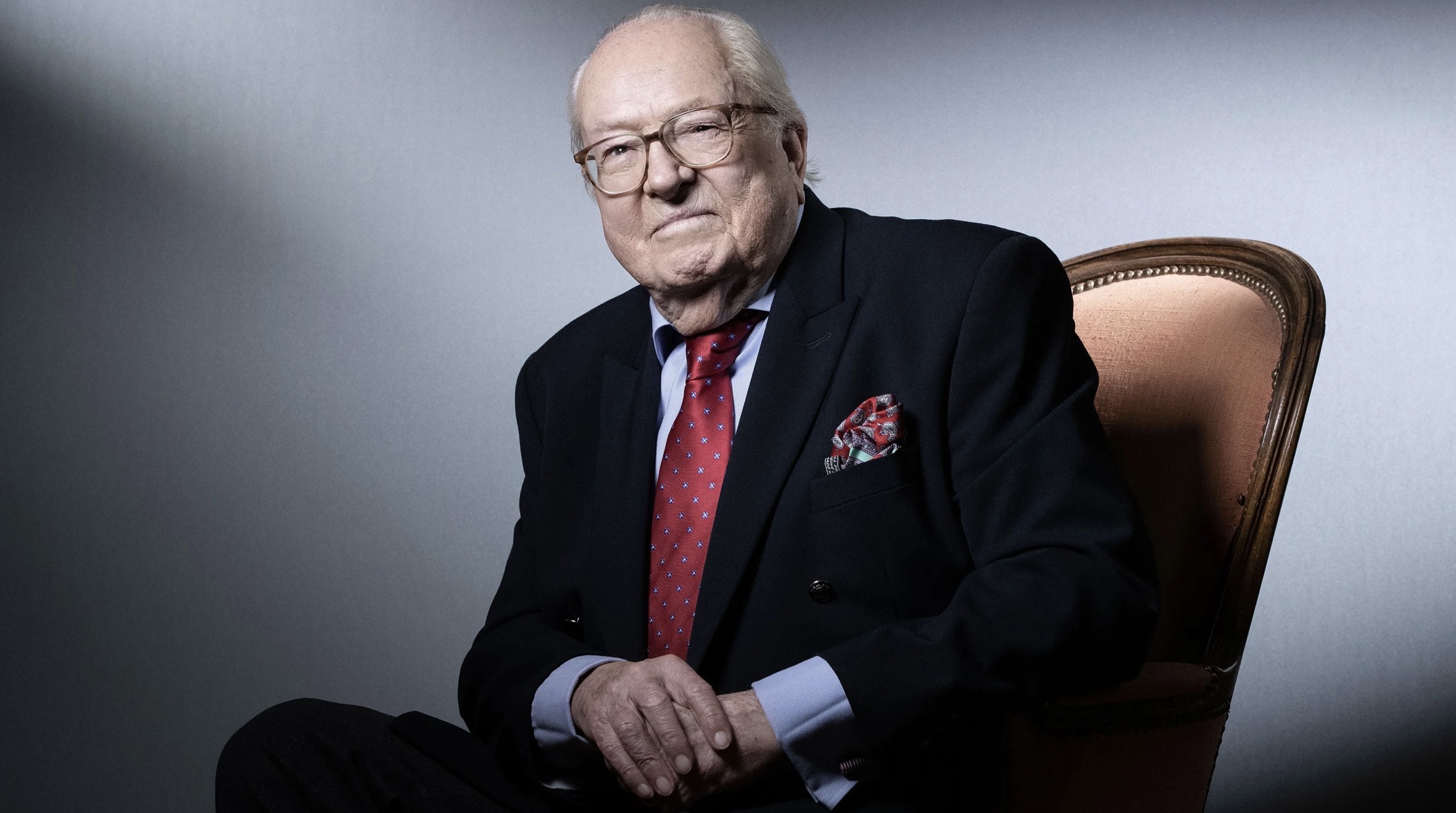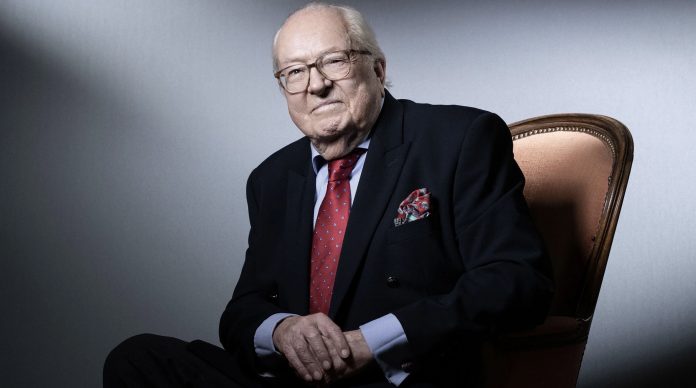ฌอง-มารี เลอ แปน ผู้เป็นบิดาของมารีน เลอ แปน และเป็นบุคคลสำคัญในกระแสการเมืองฝ่ายขวาจัดของฝรั่งเศสหลังสงครามโลก เสียชีวิตแล้วในวัย 96 ปี ตามรายงานของเครือข่าย BFMTV
จากการก่อตั้งพรรค National Front (ปัจจุบันเปลี่ยนชื่อเป็น National Rally หรือ RN) จนถึงการเป็นสมาชิกรัฐสภาที่อายุน้อยที่สุดของฝรั่งเศส ฌอง-มารี เลอ แปน มีบทบาทในทุกช่วงของการเมืองฝ่ายขวาจัดในยุคหลังสงคราม
เส้นทางการเมืองของเขากินระยะเวลาหลายทศวรรษ ในปี 1956 ขณะอายุเพียง 27 ปี เขาได้รับเลือกเป็นสมาชิกรัฐสภาฝรั่งเศส ต่อมาในปี 1972 เขาก่อตั้งพรรค National Front ร่วมกับอดีตผู้ร่วมมือกับนาซีและทหารผ่านศึกจากความล้มเหลวของฝรั่งเศสในอัลจีเรียและอินโดจีน
ในปี 2007 เขาเป็นผู้สมัครชิงตำแหน่งประธานาธิบดีที่มีอายุมากที่สุดในประวัติศาสตร์ฝรั่งเศส โดยเป็นครั้งที่ 5 ที่เขาลงสมัครแต่ไม่ประสบความสำเร็จ เขายังคงดำรงตำแหน่งสมาชิกรัฐสภายุโรปจนถึงปี 2019
บุคคลที่สร้างความขัดแย้งตลอดชีวิต
ฌอง-มารี เลอ แปน เกิดเมื่อวันที่ 20 มิถุนายน 1928 ในหมู่บ้านชายทะเลชื่อ La Trinité-sur-Mer ในแคว้นบริตตานี พ่อของเขาเสียชีวิตในปี 1942 จากทุ่นระเบิดที่ระเบิดเรือหาปลา
ในวัยหนุ่ม เลอ แปนมีแนวคิดนิยมกษัตริย์และเข้าศึกษาด้านกฎหมายในกรุงปารีส หลังจากนั้นเขาเข้าร่วมกองทหารต่างชาติฝรั่งเศสในปี 1954 โดยรับหน้าที่เป็นพลร่มในอัลจีเรียและอินโดจีน
เขาถูกกล่าวหาว่ามีส่วนเกี่ยวข้องกับการทรมานนักโทษในอัลจีเรีย ซึ่งเขาเคยยอมรับในปี 1962 ว่า “เราเคยทรมานในอัลจีเรีย เพราะมันเป็นสิ่งที่ต้องทำ” แม้จะอ้างว่าหมายถึง “กองทัพฝรั่งเศส” โดยรวม แต่ในปี 2005 เขาแพ้คดีฟ้องร้องหนังสือพิมพ์ Le Monde ที่รายงานคำให้การของพยานซึ่งกล่าวหาว่าเลอ แปนและหน่วยของเขาเคยทรมานคนในครอบครัวของพยานจนถึงแก่ความตาย
ตลอดชีวิตการเมือง เลอ แปนสร้างความขัดแย้งอย่างต่อเนื่อง ไม่ว่าจะเป็นการอธิบายว่าห้องรมแก๊สของนาซีเป็นเพียง “รายละเอียดเล็กน้อยของประวัติศาสตร์” ซึ่งนำมาสู่การถูกปรับหลายครั้ง หรือการต่อต้านผู้อพยพอย่างรุนแรง โดยเฉพาะจากอดีตอาณานิคมแอฟริกาเหนือ
ราชวงศ์การเมืองฝ่ายขวาจัด
หลังจากเขาสละตำแหน่งผู้นำพรรคในปี 2011 มารีน เลอ แปน ลูกสาวของเขาเข้ามารับตำแหน่งต่อ พร้อมปรับเปลี่ยนภาพลักษณ์ของพรรคให้ดูเป็นมิตรและยอมรับได้ในกระแสการเมืองหลัก ทำให้พรรคได้รับการสนับสนุนเพิ่มขึ้น
อย่างไรก็ตาม ความสัมพันธ์ระหว่างเลอ แปนและลูกสาวของเขากลับตึงเครียดมากขึ้น โดยในปี 2015 มารีนได้ขับไล่เขาออกจากพรรคที่เขาเป็นผู้ก่อตั้ง หลังจากที่เขายืนยันคำพูดเกี่ยวกับห้องรมแก๊สของนาซี
ถึงแม้ความขัดแย้งจะดำเนินไป แต่พรรค RN ภายใต้การนำของมารีนยังคงสร้างผลงานได้ดี ในปี 2022 พรรคได้รับคะแนนเสียง 41.5% ในการเลือกตั้งรัฐสภา และเข้าใกล้ตำแหน่งประธานาธิบดีฝรั่งเศสมากที่สุดในประวัติศาสตร์
นอกจากนี้ หลานสาวของเลอ แปน มาริยง มาเรชาล ยังตั้งพรรคการเมืองของเธอเองที่มีจุดยืนขวาจัดยิ่งกว่า RN เสริมสร้างบทบาทของราชวงศ์การเมืองฝ่ายขวาในฝรั่งเศส
แม้เขาจะจากไปแล้ว แต่มรดกทางการเมืองของฌอง-มารี เลอ แปน ยังคงส่งผลต่อกระแสการเมืองในฝรั่งเศสและยุโรปในปัจจุบัน
Jean-Marie Le Pen, founder of France’s far-right National Front party, dies at 96

Jean-Marie Le Pen, father of Marine Le Pen and the defining figure of France’s postwar far-right movement, has died at the age of 96, according to French network BFMTV.
From founding the National Front party – which his daughter has taken to new heights as National Rally (RN) – to his election as France’s youngest lawmaker, Jean-Marie Le Pen was present at every stage of the French far right’s post-war history.
His political career spanned decades. In 1956, at the age of 27, he was elected to the French National Assembly. He then forged the National Front in 1972 with wartime Nazi collaborators and veterans of France’s colonial disasters in Algeria and then-Indochina.
In 2007, he became the oldest person to stand as a presidential candidate in what would become his fifth unsuccessful attempt. He reached his 90th birthday as a member of the European parliament – a post he retained until 2019.
Jordan Bardella, president of the RN party, said Le Pen “always served France, defending its identity and sovereignty.”
“My thoughts today are with his family and loved ones, and of course with Marine who is mourning, we must respect that,” Bardella said in a Tuesday post on X.
But those on the opposite end of the political spectrum were not as favorable in their memory of Le Pen.
“Respect for the dignity of the dead and the grief of their loved ones does not erase the right to judge their actions. Those of Jean-Marie Le Pen remain intolerable,” said Jean-Luc Mélenchon, leader of the far-left France Unbowed party.
“The fight against the man is over. The fight against the hatred, racism, Islamophobia and anti-Semitism that he spread continues,” Mélenchon posted on X Tuesday.
Torture allegations
Born on June 20, 1928, in the seaside village of La Trinite-sur-Mer in Brittany, Jean-Marie Le Pen’s father, Jean, died in 1942 when a wartime mine blew up his fishing boat.
A monarchist in his youth, Le Pen attended law school in Paris in the 1940s and in 1954 joined the French Foreign Legion, serving as a paratrooper in Algeria and in French Indochina.
Throughout his life, he was dogged by allegations of torture in Algiers. In November 1962, he told the newspaper Combat, “I have nothing to hide. We tortured in Algeria because we had to.” Le Pen later claimed “we” referred to the French army, not him personally.
However, he lost his lawsuit against Le Monde in 2005, when the newspaper interviewed Mohamed Cherif Moulay, who said that at the age of 12 he watched then-Lt. Le Pen and his unit burst into the family home in Algiers. They beat and tortured his father to death with electricity, Moulay recounted.
In 1956, Le Pen was elected to the National Assembly as a Paris MP on the ticket of the anti-tax populist Pierre Poujade. Re-elected in 1958, then defeated in 1962, he founded a record company which sold recordings of Nazi speeches and German military songs.
In the next decade, he co-founded the National Front, which violently opposed immigration, especially from France’s former North African colonies, and greater European integration.
In 1974, he took his first run at the presidency, winning less than 1% of the vote in the first round.
Le Pen and his family survived a bomb attack in 1976, which ripped apart their Paris home. The crime, which was never solved, was later described as a formative moment by his daughter Marine.
Le Pen courted controversy throughout his career. In the 1960s, he received a two-month suspended prison sentence for “apology of war crimes,” and has repeatedly described Nazi gas chambers as a mere “detail,” incurring fines on three occasions for denying crimes against humanity.
Through convictions, meager political results nationally and fractures in his own camp, Le Pen proved a tenacious centerpiece for the extreme right.
He achieved his political zenith in 2002, reaching the presidential runoff and sparking a nationwide coming-together of his political opponents – a political “dam” in French – to block the far-right from the Elysee Palace.
A political dynasty
For more than a decade, many in France thought that the 2002 poll would be enough of a warning to forever keep the far right from power. However, in 2011, he was succeeded as National Front leader by Marine, who modernized the party, softening its rhetoric and positing it as a viable alternative to mainstream political parties.
As Marine’s political career took flight, so did scrutiny over her father’s racist outbursts in the media. Le Pen went on to deny racial equality, praise the Ebola virus as a solution to Europe’s “immigration problem,” and repeat his Holocaust denial after he was elected to the European Parliament once more in 2014.
Their fraught relationship spilled further into public view in 2015, when Marine expelled her father from the party that he’d created – after he reiterated his claim that the Nazi gas chambers had been but a detail of history.
After years of campaigning in the shadow of her father, Marine led the party to win 41.5% of the vote in the 2022 parliamentary elections, putting the French far right closer to the presidency than ever before.
Two years later, she picked 28-year-old Bardella to be leader of the party – in an attempt to broaden her appeal to younger voters. The party won the first round of parliamentary elections before being thwarted by tactical voting in the second.
Despite that loss, RN was still the most popular party among French voters under 34, with 32% of the vote – a 10-point rise compared to 2019 – after pushing a strain of xenophobic popular nationalism that today looms large over the continent.
Le Pen’s granddaughter, Marion Maréchal, also established her own party even further to the right, cementing the dynasty’s hold over that wing of French politics.
By Saskya Vandoorne and Joseph Ataman, CNN

















